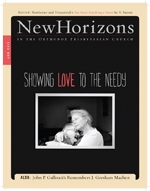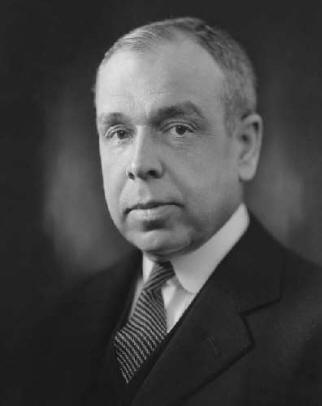This article appeared in Horizons and is available here. (My underlining).
J. Gresham Machen, Man of God
John P. Galbraith
Most people who know the name J. Gresham Machen think almost exclusively: theologian. That is understandable. He was one of God's great theologians, and he was known widely through his theological writings. Yet, deep as his theology was, it was only the foundation of what the man Machen really was.
It was my inestimable privilege to be a student of his for two and a half years at Westminster Theological Seminary in Philadelphia, from September 1934 until his death on January 1, 1937. It may be that I, at age 97, am the only one living who knew him as a teacher and in his ministerial calling. It is such a privilege to still have the memories!
It was not Machen the theologian who drew me to Westminster. It was Machen the loving and devoted follower of Jesus his Savior, the one who raised the flag of truth at all costs, who gripped me. His watchword, as it were, was: God's Word is my command. Before I ever entered seminary, what would become a lifelong memory was founded. For Machen, it was not just a Presbyterian conflict in which he had become engaged, but a proclamation of the gospel for the entire world. His positions were, thus, not of his own devising, but the careful exegesis of the Scriptures.
Machen, however, was more than a theologian, more than a devotee of God's Word. He was a quiet, kind, modest, and sociable person. He was of medium height, a little bit overweight, and he always had a sparkle in his eyes. He was attentive to his students and did many fine things for them. Occasionally he would have what he called a "Checker Club" on a Saturday evening in his apartment building, Chancellor Hall, a high-rise a few blocks from the Seminary. He set out games (especially checkers and chess) and bowls of fruit and snacks, and he mixed well with the students. He would say, "Don't be a tightwad!"— hoping that we would be generous to ourselves.
At other times, when he was home over a weekend (he had many preaching engagements), he would send word to our "dormitory," the Gladstone Hotel, that anyone available was welcome to have dinner with him at the fashionable Drake Hotel on Sunday after morning worship. During the football season — he was an avid college-football fan —h e would buy groups of tickets to games at the University of Pennsylvania and distribute them among the students at Westminster.
As a professor, he was careful, clear, and precise in his teaching. When I caught on to how he approached New Testament exegesis, I took every one of his elective exegesis courses that I could. One of his major purposes was to teach us to arrive at the meaning of the text without making unwarranted assumptions. That emphasis fitted well with a famous emphasis of his Old Testament colleague and our professor, Oswald T. Allis: "Gentlemen, respect the silences of Scripture!" Never were we allowed to forget that the text is the Word of God and that the Word of God is what we preach.
Machen also had a built-in means of entertaining students. He was certainly not a curmudgeon, as his enemies declared. If anything, he was a humorist! One could say, even, that he was a stand-up comedian. He had a number of delightful stories that did not use words, but sounds made with his mouth — all told with those sparkling eyes. Being a student of Machen was not all work.
Dr. Machen, to the surprise of many, was an enthusiastic mountain climber, particularly in the Swiss Alps, though also in the Canadian Rockies and in the U.S. He loved the beauty and majesty of the natural world, and was thrilled to stand at the summits of great peaks and glory in what God had made. One of his favorite climbing adventures was Cadillac Mountain on Mount Desert Island, off the coast of Maine. He was horrified, and personally protested, that the mountain would be ruined by the building of a road in the interests of tourists. This was somewhat like his protest against the City of Philadelphia passing a law to forbid pedestrians from crossing intersections in the downtown over against a traffic signal.
He did indeed have his prejudices — such as his disdain for a new translation of the Bible that he believed was not as good as it should be. As a guest preacher at Immanuel Church in Morristown, New Jersey (now Immanuel OPC in Whippany), he began to use the pulpit Bible, saw what translation it was, and set it aside. He then used his own King James Bible.
On a more serious note, he did not try to impose his views on others. When the doctrinal conflict arose in the Presbyterian Church in the USA, he followed the set procedures for addressing his problems to the proper authorities. As the conflict turned toward a decision, some fellow students and I travelled to Trenton to view the conclusion of Machen's trial before the Presbytery of New Brunswick (New Jersey). When he was told to rise, he rose without a word. He was silent as charges were read to him, and then was seated. I could not refrain from thinking of Isaiah 53, which says of Christ, "as a lamb before his shearers is dumb, so he opened not his mouth." Later, when he had been declared guilty of disturbing the peace and unity of the Church, and the Church had been told that it was the duty of all members to support whatever the Church allowed, he saw that his only way to avoid participating in the false teachings of the PCUSA was to leave it. His course, if his church was going to require him to support unbelief, was to join with others in a new church that would seek to follow the Word of God as the final standard of truth in all things.
Machen stood alone at Trenton, but the next month (June 1936) I had the privilege, with my father, mother, and sister, to stand with him and one hundred and twenty-six others called together through the Presbyterian Constitutional Covenant Union at the New Century Club in Philadelphia. We stood when those desiring to affiliate with a new church were called to rise and be counted as founding members of the Presbyterian Church of America (renamed the Orthodox Presbyterian Church in 1939). Then, from that group, thirty-four ministers and seventeen elders (including my father) constituted the Church's First General Assembly. Dr. Machen was elected without opposition as the moderator. Machen himself would say, "We became members at last of a true Presbyterian Church." What a memory to have of the man whom God chose to lead us, J. Gresham Machen, man of God.
The author, a retired minister, has served the OPC in many capacities. New Horizons, January, 2011.










